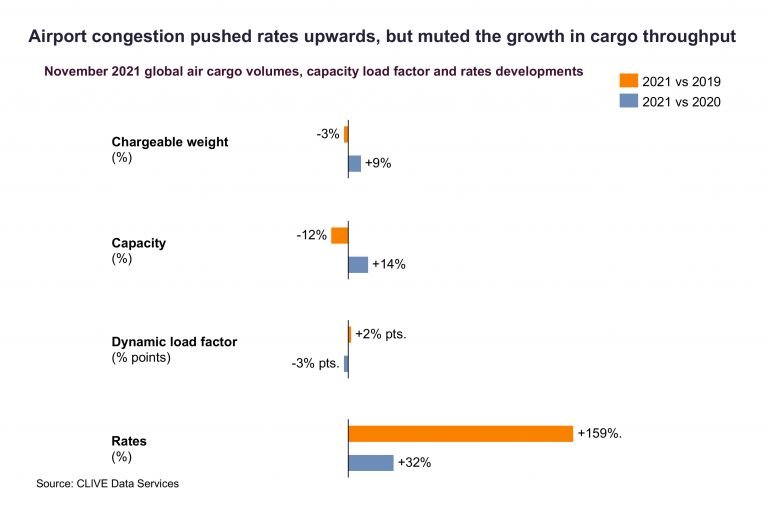Air cargo congestion
According to CLIVE Data Services, the volume of goods in November 2021 decreased by 1.2% compared to the previous month. This is in stark contrast to the usual trend of increased demand during the peak season at the end of the year.
Although capacity has increased by 0.5%, output is still experiencing a decline. Meanwhile, overall air freight prices increased by 8% in November. Compared to November 2019, volume decreased by 3% and weight decreased by 12%, but the growth rate was about 159% higher than that of November. pre-Covid levels.

“This is also what we have seen reported in the ocean freight market, in the US West Coast ports. Labor shortages are a factor in all industries, but this is particularly affecting labor-intensive industries such as air transport, especially overland,” said Niall van de Wouw, Clive DM, “Airport congestion seems to be the price the industry pays for its lack of investment and appreciation for cargo handling.”
Inefficient handling of airport warehouses in major hubs such as Los Angeles and Amsterdam has caused massive congestion. Ground staff blamed the forwarders for not picking up the goods.

The air cargo market is ‘fragile’ as it enters the traditional peak season and loads of pallets and containers are waiting on the tarmac. According to Flexport, congestion in Amsterdam is improving, but other European hubs are still being affected.
Congestion causes many challenges
If this situation continues until the end of the year, it will negatively affect the transit time of the forwarders. To deal with this, companies need to hire more temporary employees, implement new processes, and consider investing in their infrastructure.
Meanwhile, capacity constraints continue to be the main challenge in Asia. Specifically, according to Flexport, demand from North China to Europe is “growing rapidly,” which has pushed up freight rates.
In addition, in South China, the forwarder said there were passengers canceling flights in Hong Kong and Guangzhou, possibly because of Covid-19 restrictions and airlines refusing shipments. big. Air cargo from Southeast Asia is also facing similar capacity constraints.

According to Flexport, “Airlines outside of Bangkok can only accept small shipments and space is extremely tight outside of South Vietnam for all eastbound transpacific routes. Export demand is still growing and warehouses are overloaded with goods.”
Thanh Thảo
Transatlantic air freight was forecasted to grow sharply













